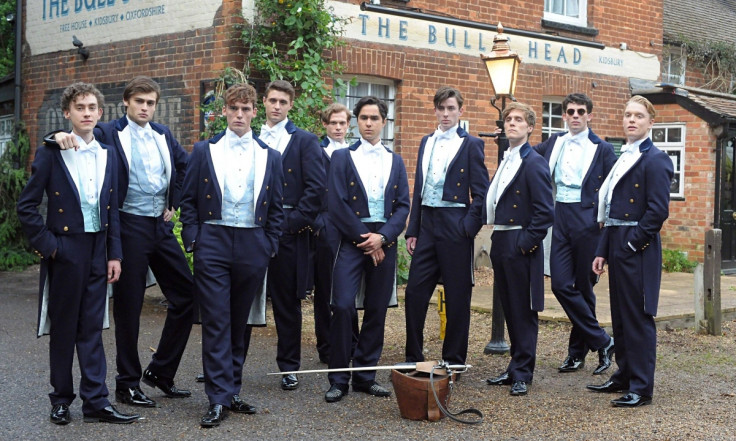Oxbridge struggles to shake off its negative posh and rich reputation - acts like this don't help

I can remember my first "drinking society" night out in Cambridge. I was dressed as an explorer, my best friend was a tiger and during the middle of our requisite meal of cheap chicken korma and wine served in plastic cups, the male student sitting next to me keeled over and promptly vomited under my chair. He then sat up, wiped his mouth and resumed eating his curry.
We were only four weeks into our first term and my fellow first years and I had already formed a society for our year. Proudly naming ourselves The Damsels, we had been invited out by a male society from a different college for what Cambridge students refer to as a "swap" (in Oxford it's a crew-date), whereby a group of male students and a group of female students all go either to formal hall or for a curry and, sitting boy-girl-boy-girl, proceed with an evening of "pennying" and drinking "fines" (Cambridge) or "sconces" (Oxford).
Apart from the vomit, it was all fairly harmless. Granted, there was an element of sexism: "fines" were targeted to embarrass one girl who was overly familiar with more than a few of the male students, every now and again one male student would overstep the mark and make jokes that most of the table, male and female, agreed were "just not OK" and, before the evening, there had been an ongoing debate as to whether we should go out with a group of boys whose fancy dress suggestion had been "Baywatch".
But at no point during the evening did we feel unsafe or any more threatened than we would have done during a "normal" night out anywhere in the country. We went out, we got a bit drunk and did the things you do when you're 19, plastered on cheap wine and dancing to a remix of The Lion King soundtrack.
Our experience couldn't have been further from the popular opinion of Oxbridge drinking societies, entrenched by films such as The Riot Club and tales of David Cameron's Bullingdon Club antics. Nor, for that matter, could it have been further from the experience of current students who've come into contact with the so-called gentlemen of a banned drinking society at a college at Cambridge University.

The college is reportedly under investigation after claims there were drinking fines that allegedly included "fine if you've tried having sex with a passed out girl", "fine if you've recorded someone giving you a blowjob", "fine if you've ever racially abused someone because they wouldn't get with you" and "stand up if you hate the poor". In the words of one female student who attended one of their swaps, it was "like a contrived thing where they aimed to go and be misogynistic, vile and take advantage".
Contrived their behaviour may well be, marking them out as part of a long tradition of misogyny, sexism and intolerance that characterises the image of their societies. Whether it's the Cambridge Wyvern's notorious garden party, where the main event used to be bikini-clad girls wrestling in a pool of jelly, the same drinking society reportedly parading through the streets of Oxford chanting "rape" or the Hertford College "Penguins" inviting only the "fittest" freshers to a crew-date, imaginatively themed "foxes and hunters", accusations of sexism are undeniably rife within the world of these societies.
And yet what's most frustrating is that examples of drinking society sexism are a classic case of the few ruining it for the many. When I asked a former member of The Pitt Club, the Cambridge equivalent of Oxford's Bullingdon, about its rumoured sexism and debauchery, he replied that he mainly used it a place to get a good meal. "It's gotten much better over the last few years," he told me. "Most of the guys I knew would never get up to any of that stuff, it's just that you always get a few idiots who get to uni and think that automatically means they have to act like one of the 'lads'."
Worryingly, it is this few who are harming not just the majority but prospective students too. While inevitably nothing can be written about Oxbridge drinking societies without it being mentioned that it's the future leaders of the country who are standing on tables downing bottles of £4 wine, Oxford and Cambridge are continuing to struggle to shake off their reputation of being beacons of privilege, wealth and social exclusion.
While one in 100 state school students will get into Oxbridge, for privately educated students, that figure is one in 20, and, due to drinking societies, applicants from less-privileged backgrounds are confronted with stories that only serve to confirm their prejudices and deter them applying from a place where they might be targeted by jokes.
Ask most Oxbridge students about their experience of drinking societies and, most of the time, you'll hear comic tales about the time so-and-so decided to streak the college quad or about that time everyone ended up on the chapel roof at 5am.
Most of the time, when we talk about the antics of Oxbridge drinking societies, we forget Oxbridge students are students just like any others, that they have just as much of a right to make complete fools of themselves (if not more given they'll probably have to be in the library at 9am the next morning) and that "lad banter" is part of university life. It's just frustrating that an all-too vocal minority all-too frequently cross the line between banter and misogyny and promulgate an image of Oxbridge university life that only reinforces the same old stereotypes.
© Copyright IBTimes 2024. All rights reserved.






